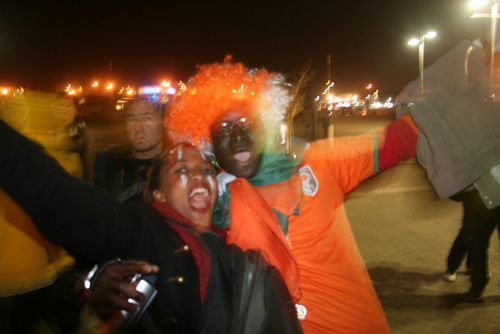Let me begin with this: I am a Bama: literally, from Alabama. Before I am an intellectual, a diasporic subject, a celebrator of transatlantic blacknesses who carefully sidesteps essentialism and embraces all of humanity, I am a Bama. Granted, these other more academia friendly aspects of myself have been nurtured since birth by the leftist intellectual communities of my parents. But I was a Grandma’s (or better yet my Mudeah’s) girl, and that means I know who my folk are and what they expect. It is for them I do what I do.
So I watched the World Cup as an American of a very particular sort. And as such, when it comes to sports, I have always rooted for Blackfolks. It is a lesson I learned implicitly. I tested it once on my older cousin as we watched a game of Family Feud. I was around 6. It was around 1978. I slyly asked him: “Which family are you rooting for?” without mentioning the blackness of the black one or the whiteness of the white. He looked at me like I was crazy. Test results as expected.
So when the US-Ghana match approached, and I sat laughing and drinking and carrying on with a group of other Black women professors who were fellow conference attendees, I was stunned, floored, outdone, when the one Ghanaian among us asked “Who is rooting for Ghana tomorrow?!” and only a third of us hooted “me!”
”I got to go with the US on this one” one woman, who if not a Bama was something close, perhaps a Georgian, said grimly.
Immediately I thought this might be evidence of the delusion of post-racial Obama-nation. Even these smart women were caught up in the rapture of the slim possibility of a Black elite admission to the meat of American citizenship despite evidence of comprehensive and sustained exclusion for the majority of our folks! I sat there and wrote the post-racial jeremiad in my head while trying to remain polite, (I don’t imagine the frozen smile was convincing.)
But when I returned to my hotel room, I considered why I assumed loyalty to Ghana. And why did it come so automatically to me? It had something to do with the history of imperialism and the transatlantic slave trade. It had something to do with the global inequality that remains like the bloodstained walls of murder scene. It had something to do with how soccer is an elite sport, but futbol is a street game. It had something to do with my very American and African American triumph of the little guy, my love of David over Goliath. And of course it had everything to do with race in the Black American sense. One team had all brothers, the other had just a few.
My order of loyalty in the World Cup went something like this: African nations over all others. If an African nation is not playing, then I root for the nation that has been colonized, the caveat being if the other team is a colonizer that has a majority presence of people of color with roots in formerly colonized states. Then, I revert to my rooting for Black norm. If the teams are two colonial powers, I root for the team with more people of color. As you can see, I am far from post-racial.
But the reality I work from is this: the history of the 19th and much of the 20th century is still with us. It is still framing our economies, our ideologies, our ideals, our assumptions, our values and our faith. As an intellectual I try to work through this landscape and think with justice and clarity. As a sports fan I gut-push back against the legacies of empire with my hope and adoration. And Ghana, oh Ghana! She played for the continent. She maintained her historic role in the vision of a Pan Africanism borne through reverse migrations and rearticulations of a black subjectivity — written as democracy, self determination, and interdependence. Ghana, where the broad cheek-bones and bright eyes look like those of a ‘Bama, where aesthetics can function not as mere cynical genealogy but as a symbolics of self love in the face of historic devastation. With Ghana, I never made the calculus of nation vs. nation. The victory holler just sprang fully formed from my heart.
Imani Perry is a Professor in the Center for African American Studies at Princeton University. She is the author of Prophets of the Hood: Politics and Poetics in Hip Hop (Duke University Press, 2004) and the forthcoming More Beautiful and More Terrible: The Embrace and Transcendence of Racial Inequality in the United States (New York University Press, 2011). Her articles are available on her website: http://www.imaniperry.com
Photo by Kwame Nyong’o


